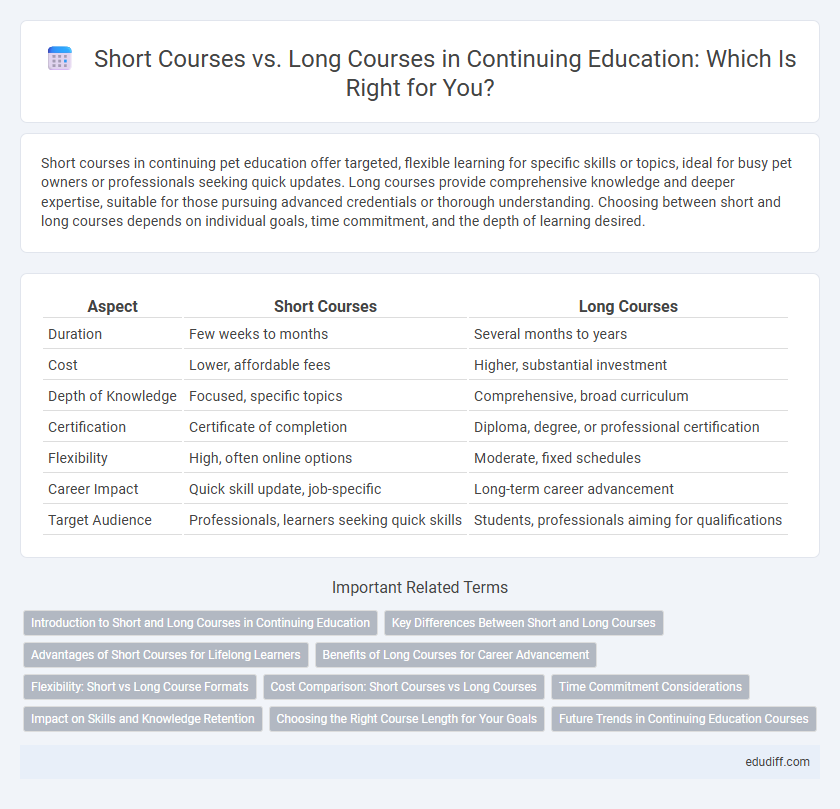Short courses in continuing pet education offer targeted, flexible learning for specific skills or topics, ideal for busy pet owners or professionals seeking quick updates. Long courses provide comprehensive knowledge and deeper expertise, suitable for those pursuing advanced credentials or thorough understanding. Choosing between short and long courses depends on individual goals, time commitment, and the depth of learning desired.
Table of Comparison
| Aspect | Short Courses | Long Courses |
|---|---|---|
| Duration | Few weeks to months | Several months to years |
| Cost | Lower, affordable fees | Higher, substantial investment |
| Depth of Knowledge | Focused, specific topics | Comprehensive, broad curriculum |
| Certification | Certificate of completion | Diploma, degree, or professional certification |
| Flexibility | High, often online options | Moderate, fixed schedules |
| Career Impact | Quick skill update, job-specific | Long-term career advancement |
| Target Audience | Professionals, learners seeking quick skills | Students, professionals aiming for qualifications |
Introduction to Short and Long Courses in Continuing Education
Short courses offer concise, focused learning experiences designed for quick skill acquisition and immediate application, typically ranging from a few hours to several weeks. Long courses provide comprehensive, in-depth study over months or years, often culminating in formal qualifications or certifications. Both formats cater to diverse learner needs in continuing education, balancing flexibility and depth for professional and personal development.
Key Differences Between Short and Long Courses
Short courses typically range from a few hours to several weeks, offering focused, concise learning on specific topics, while long courses extend over several months or years, providing comprehensive and in-depth education. Key differences include intensity, duration, certification value, and career impact, with short courses ideal for skill enhancement and quick knowledge acquisition, and long courses suited for foundational expertise and formal qualifications. Short courses often emphasize practical skills and immediate applicability, whereas long courses cover broader theoretical frameworks and critical thinking development.
Advantages of Short Courses for Lifelong Learners
Short courses offer lifelong learners flexibility and accelerated skill acquisition, enabling them to quickly adapt to evolving industries. These programs often emphasize practical, targeted knowledge that suits busy schedules and immediate application. Cost-effectiveness and the ability to update expertise frequently also position short courses as ideal for continuous personal and professional development.
Benefits of Long Courses for Career Advancement
Long courses provide in-depth knowledge and comprehensive skill development, making them ideal for career advancement and specialized roles. Employers often value candidates with extensive training, viewing long courses as evidence of commitment and expertise in a field. The structured learning environment of long courses also fosters networking opportunities and mentorship, essential for professional growth.
Flexibility: Short vs Long Course Formats
Short courses offer greater flexibility by allowing learners to complete modules at their own pace, often with less rigid scheduling compared to long courses. Long courses typically follow structured timelines with fixed class hours and extensive curricula, which may limit adaptability for working professionals or those with busy schedules. Choosing short course formats enhances the ability to balance education with personal and professional commitments while focused long courses provide in-depth expertise over extended periods.
Cost Comparison: Short Courses vs Long Courses
Short courses typically offer a more affordable option with lower tuition fees and reduced ancillary costs compared to long courses. Long courses often incur higher overall expenses due to extended duration, including accommodation, materials, and living costs. Budget-conscious learners can benefit from the cost efficiency of short courses while gaining essential skills in a shorter timeframe.
Time Commitment Considerations
Short courses typically require a minimal time commitment, often ranging from a few hours to several weeks, making them ideal for professionals seeking quick skill acquisition. Long courses demand a more extensive time investment, sometimes spanning months or years, which suits learners aiming for in-depth knowledge and comprehensive certification. Evaluating personal schedules and learning goals is crucial when choosing between short and long courses based on time commitment.
Impact on Skills and Knowledge Retention
Short courses provide focused, intensive learning that enhances specific skills quickly but may offer limited long-term knowledge retention due to their condensed format. Long courses facilitate deeper understanding and stronger retention by allowing extended engagement with material through comprehensive content and progressive skill-building activities. Studies show that spaced repetition and ongoing practice in long courses significantly improve the durability of acquired knowledge and skill proficiency over time.
Choosing the Right Course Length for Your Goals
Selecting the appropriate course length depends on your career objectives and available time commitment. Short courses offer intensive, focused learning suited for skill upgrades or immediate application, while long courses provide comprehensive knowledge and in-depth mastery beneficial for professional development or academic advancement. Assessing your goals and learning style ensures optimal course duration for maximizing educational outcomes.
Future Trends in Continuing Education Courses
Future trends in continuing education courses indicate a growing preference for short courses due to their flexibility, affordability, and quick skill acquisition tailored to rapidly evolving industries such as technology, healthcare, and finance. Long courses remain relevant for in-depth expertise and credentialing but face challenges from digital platforms offering micro-credentials and stackable certificates that align with workforce demands. Hybrid learning models combining short-term online modules with interactive, in-person sessions are emerging as a balanced approach to meet diverse learner needs and maximize career advancement opportunities.
Short Courses vs Long Courses Infographic

 edudiff.com
edudiff.com